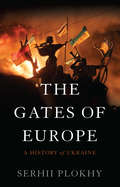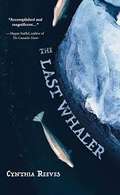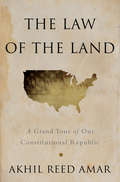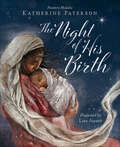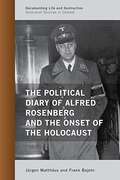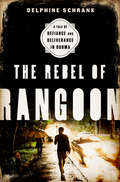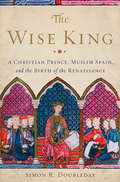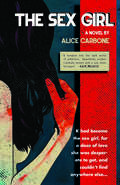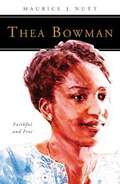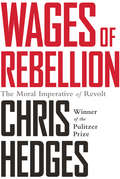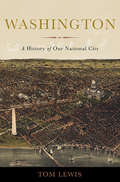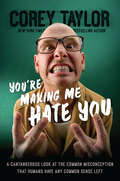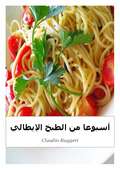- Table View
- List View
The Gates of Europe
by PlokhyUkraine is currently embroiled in a tense battle with Russia to preserve its economic and political independence. But today’s conflict is only the latest in a long history of battles over Ukraine’s existence as a sovereign nation. As award-winning historian Serhii Plokhy argues in The Gates of Europe, we must examine Ukraine’s past in order to understand its fraught present and likely future. Situated between Europe, Russia, and the Asian East, Ukraine was shaped by the empires that have used it as a strategic gateway between East and West—from the Romans and Ottomans to the Third Reich and the Soviet Union, all have engaged in global fights for supremacy on Ukrainian soil. Each invading army left a lasting mark on the landscape and on the population, making modern Ukraine an amalgam of competing cultures. Authoritative and vividly written, The Gates of Europe will be the definitive history of Ukraine for years to come.
The Gates of Europe
by PlokhyUkraine is currently embroiled in a tense battle with Russia to preserve its economic and political independence. But today’s conflict is only the latest in a long history of battles over Ukraine’s existence as a sovereign nation. As award-winning historian Serhii Plokhy argues in The Gates of Europe, we must examine Ukraine’s past in order to understand its fraught present and likely future. Situated between Europe, Russia, and the Asian East, Ukraine was shaped by the empires that have used it as a strategic gateway between East and West—from the Romans and Ottomans to the Third Reich and the Soviet Union, all have engaged in global fights for supremacy on Ukrainian soil. Each invading army left a lasting mark on the landscape and on the population, making modern Ukraine an amalgam of competing cultures. Authoritative and vividly written, The Gates of Europe will be the definitive history of Ukraine for years to come.
The Law of the Land: A Grand Tour of Our Constitutional Republic
by Akhil Reed AmarFrom Kennebunkport to Kauai, from the Rio Grande to the Northern Rockies, ours is a vast republic. While we may be united under one Constitution, separate and distinct states remain, each with its own constitution and culture. Geographic idiosyncrasies add more than just local character. Regional understandings of law and justice have shaped and reshaped our nation throughout history. America’s Constitution, our founding and unifying document, looks slightly different in California than it does in Kansas. In The Law of the Land, renowned legal scholar Akhil Reed Amar illustrates how geography, federalism, and regionalism have influenced some of the biggest questions in American constitutional law. Writing about Illinois, "the land of Lincoln,” Amar shows how our sixteenth president’s ideas about secession were influenced by his Midwestern upbringing and outlook. All of today’s Supreme Court justices, Amar notes, learned their law in the Northeast, and New Yorkers of various sorts dominate the judiciary as never before. The curious Bush v. Gore decision, Amar insists, must be assessed with careful attention to Florida law and the Florida Constitution. The second amendment appears in a particularly interesting light, he argues, when viewed from the perspective of Rocky Mountain cowboys and cowgirls. Propelled by Amar’s distinctively smart, lucid, and engaging prose, these essays allow general readers to see the historical roots of, and contemporary solutions to, many important constitutional questions. The Law of the Land illuminates our nation’s history and politics, and shows how America’s various local parts fit together to form a grand federal framework.
The Nordic Minuet: Royal Fashion and Peasant Tradition
by Petri Hoppu;Egil Bakka;Anne FiskvikThis major new anthology of the minuet in the Nordic countries comprehensively explores the dance as a historical, social and cultural phenomenon. One of the most significant dances in Europe, with a strong symbolic significance in western dance culture and dance scholarship, the minuet has evolved a distinctive pathway in this region, which these rigorous and pioneering essays explore. As well as situating the minaret in different national and cultural contexts, this collection marshals a vast number of sources, including images and films, to analyze the changes in the dance across time and among different classes. Following the development of the minuet into dance revival and historical dance movements of the twentieth century, this rich compendium draws together a distinguished group of scholars to stimulate fresh evaluations and new perspectives on the minuet in history and practice. The Nordic Minuet: Royal Fashion and Peasant Tradition is essential reading for researchers, students and practitioners of dance; musicologists; and historical and folk dancers; it will be of interest to anybody who wants to learn more about this vibrant dance tradition.
The Political Diary of Alfred Rosenberg and the Onset of the Holocaust
by Frank Bajohr Jürgen MatthäusPublished in association with the United States Holocaust Memorial Museum <P><P> In December 2013, after years of exhaustive search, the U.S. Holocaust Memorial Museum received more than four hundred pages of diary notes written by one of the most prominent Nazis, the Party’s chief ideologue and Reich minister for the occupied Soviet territories Alfred Rosenberg. By combining Rosenberg’s diary notes with additional key documents and in-depth analysis, this book shows Rosenberg’s crucial role in the Nazi regime’s anti-Jewish policy. In the second half of 1941 the territory administered by Rosenberg became the region where the mass murder of Jewish men, women, and children first became a systematic pattern. Indeed, months before the emergence of German death camps in Poland, Nazi leaders perceived the occupied Soviet Union as the area where the “final solution of the Jewish question” could be executed on a European scale. Covering almost the entire duration of the Third Reich, these previously inaccessible sources throw new light on the thoughts and actions of the leading men around Hitler during critical junctures that led to war, genocide, and Nazi Germany’s final defeat.
The Rebel of Rangoon: A Tale of Defiance and Deliverance in Burma
by Delphine SchrankAn epic, multigenerational story of courage and sacrifice set in a tropical dictatorship on the verge of massive transformation, The Rebel of Rangoon captures a gripping moment of possibility in Burma. Journalist Delphine Schrank spent four years underground tracking Burmese dissidents whose semi-clandestine existence and fight for democracy remained largely hidden behind their globally celebrated figurehead, Aung San Suu Kyi. With intimate, vivid prose, Schrank follows the inner life of a daredevil young dissident, his friends and rivals, across rural hamlets and flickering internet connections, into prison cells and safe houses, and deep into their own hearts, as they escape spies and outwit interrogators, fall in love or slip into insanity. Through that dissident’s perspective, Schrank unfurls a harrowing account of a country’s efforts to emerge from military dictatorship, how a movement of dissidents came into being, how it almost died, and how it pushed its government to crack apart and begin an irreversible process of political reform. In doing so, Schrank delivers a profoundly human exploration of daring and defiance and of the power and meaning of freedom.
The Wise King: A Christian Prince, Muslim Spain, and the Birth of the Renaissance
by Simon R. Doubleday"If I had been present at the Creation,” the thirteenth-century Spanish philosopher-king Alfonso X is said to have stated, "Many faults in the universe would have been avoided. ” Known as El Sabio, "the Wise,” Alfonso was renowned by friends and enemies alike for his sparkling intellect and extraordinary cultural achievements. In The Wise King, celebrated historian Simon R. Doubleday traces the story of the king’s life and times, leading us deep into his emotional world and showing how his intense admiration for Spain’s rich Islamic culture paved the way for the European Renaissance. In 1252, when Alfonso replaced his more militaristic father on the throne of Castile and León, the battle to reconquer Muslim territory on the Iberian Peninsula was raging fiercely. But even as he led his Christian soldiers onto the battlefield, Alfonso was seduced by the glories of Muslim Spain. His engagement with the Arabic-speaking culture of the South shaped his pursuit of astronomy, for which he was famed for centuries, and his profoundly humane vision of the world, which Dante, Petrarch, and later Italian humanists would inherit. A composer of lyric verses, and patron of works on board games, hunting, and the properties of stones, Alfonso is best known today for his Cantigas de Santa María (Songs of Holy Mary), which offer a remarkable window onto his world. His ongoing struggles as a king and as a man were distilled--in art, music, literature, and architecture--into something sublime that speaks to us powerfully across the centuries. An intimate biography of the Spanish ruler in whom two cultures converged, The Wise King introduces readers to a Renaissance man before his time, whose creative energy in the face of personal turmoil and existential threats to his kingdom would transform the course of Western history.
TheSexGirl
by Alice CarboneIn 1994, one month after the Northridge earthquake and two years after the riots, K moves to Los Angeles to escape her demons. That's the thing about demons though, they tend to follow. At once honest and heartbreaking, The Sex Girl digs deep into the female psyche, dealing with addiction, sex, love, and friendship. K's story, and the unique way in which it's told adds a new literary voice to the mix. Alice Carbone's fresh take on the drug addiction novel, earns a place amongst the tortured junkies. With a sense of impending tragedy, Carbone weaves K's life together through found diaries and recollections, and in doing so she unpacks the density of a single person's story.
Toevallige ontmoetingen: Bio-ethiek voor een gehavende planeet
by Kristien HensIn dit rigoureuze en noodzakelijke boek brengt Kristien Hens bio-ethiek en filosofie van de biologie bij elkaar, met het argument dat het ethisch noodzakelijk is om in het wetenschappelijk onderzoek een plaatsje vrij te houden voor de filosofen. Hun rol is behalve ethisch ook conceptueel: zij kunnen de kwaliteit en de coherentie van het wetenschappelijk onderzoek verbeteren door erop toe te zien dat specifieke concepten op een consistente en doordachte manier worden gebruik binnen interdisciplinaire projecten. Hens argumenteert dat toeval en onzekerheid een centrale rol spelen in de bio-ethiek, maar dat die in een spanningsrelatie kunnen raken met de pogingen om bepaalde theorieën ingang te doen vinden als wetenschappelijke kennis: bij het beschrijven van organismen en praktijken creëren we op een bepaalde manier de wereld. Hens stelt dat dit noodzakelijk een ethische activiteit betreft.
Wages of Rebellion
by Chris HedgesIn the face of modern conditions, revolution is inevitable. The rampant inequality that exists between the political and corporate elites and the struggling masses; the destruction wreaked upon our environment by faceless, careless corporations; the steady stripping away of our civil liberties and the creation of a monstrous surveillance system--all of these have combined to spark a profound revolutionary moment. Corporate capitalists, dismissive of the popular will, do not see the fires they are igniting. In Wages of Rebellion, Chris Hedges--a renowned chronicler of the malaise and sickness of a society in terminal moral decline--investigates what social and psychological factors cause revolution and resistance. Focusing on the stories of radicals and dissenters from around the world and throughout history, and drawing on an ambitious overview of prominent philosophers, historians, and novelists, Hedges explores what it takes to be a rebel in modern times. Hedges, using a term coined by the theologian Reinhold Niebuhr, cites "sublime madness” as the essential force that guides the actions of rebels--the state of passion that causes the rebel to engage in an unwavering fight against overwhelmingly powerful and oppressive forces. From South African activists who dedicated their lives to ending apartheid, to contemporary anti-fracking protestors in Canada, to whistleblowers in pursuit of transparency, Wages of Rebellion shows the cost of a life committed to speaking truth to power and demanding justice. This is a fight that requires us to find in acts of rebellion the sparks of life, an intrinsic meaning that lies beyond the possibility of success. For Hedges, resistance is not finally defined by what we achieve, but by what we become.
Washington: A History of Our National City
by Tom LewisOn January 24, 1791, President George Washington chose the site for the young nation’s capital: ten miles square, it stretched from the highest point of navigation on the Potomac River, and encompassed the ports of Georgetown and Alexandria. From the moment the federal government moved to the District of Columbia in December 1800, Washington has been central to American identity and life. Shaped by politics and intrigue, poverty and largess, contradictions and compromises, Washington has been, from its beginnings, the stage on which our national dramas have played out. In Washington, the historian Tom Lewis paints a sweeping portrait of the capital city whose internal conflicts and promise have mirrored those of America writ large. Breathing life into the men and women who struggled to help the city realize its full potential, he introduces us to the mercurial French artist who created an ornate plan for the city “en grande”; members of the nearly forgotten anti-Catholic political party who halted construction of the Washington monument for a quarter century; and the cadre of congressmen who maintained segregation and blocked the city’s progress for decades. In the twentieth century Washington’s Mall and streets would witness a Ku Klux Klan march, the violent end to the encampment of World War I “Bonus Army” veterans, the 1963 March on Washington for Jobs and Freedom, and the painful rebuilding of the city in the wake of Martin Luther King, Jr. ’s assassination. “It is our national center,” Frederick Douglass once said of Washington, DC; “it belongs to us, and whether it is mean or majestic, whether arrayed in glory or covered in shame, we cannot but share its character and its destiny. ” Interweaving the story of the city’s physical transformation with a nuanced account of its political, economic, and social evolution, Lewis tells the powerful history of Washington, DC—the site of our nation’s highest ideals and some of our deepest failures.
William Moorcroft, Potter: Individuality by Design
by Jonathan MallinsonWilliam Moorcroft (1872-1945) was one of the most celebrated potters of the early twentieth century. His career extended from the Arts and Crafts movement of the late Victorian age to the Austerity aesthetics of the Second World War. Rejecting mass production and patronised by Royalty, Moorcroft’s work was a synthesis of studio and factory, art and industry. He considered it his vocation to create an everyday art, both functional and decorative, affordable by more than a privileged few: ‘If only the people in the world would concentrate upon making all things beautiful, and if all people concentrated on developing the arts of Peace, what a world it might be,’ he wrote in a letter to his daughter in 1930.
With and Without Galton: Vasilii Florinskii and the Fate of Eugenics in Russia
by Nikolai KrementsovIn 1865, British polymath Francis Galton published his initial thoughts about the scientific field that would become ‘eugenics.’ The same year, Russian physician Vasilii Florinskii addressed similar issues in a sizeable treatise, entitled Human Perfection and Degeneration. Initially unheralded, Florinskii’s book would go on to have a remarkable afterlife in twentieth- and twenty-first-century Russia. <p><p> In this lucid and insightful work, Nikolai Krementsov argues that the concept of eugenics brings together ideas, values, practices, and fears energised by a focus on the future. It has proven so seductive to different groups over time because it provides a way to grapple with fundamental existential questions of human nature and destiny. With and Without Galton develops this argument by tracing the life-story of Florinskii’s monograph from its uncelebrated arrival amid the Russian empire’s Great Reforms, to its reissue after the Bolshevik Revolution, its decline under Stalinism, and its subsequent resurgence: first, as a founding document of medical genetics, and most recently, as a manifesto for nationalists and racial purists. <p> Krementsov’s meticulously researched ‘biography of a book’ sheds light not only on the peculiar fate of eugenics in Russia, but also on its convoluted transnational history, elucidating the field’s protean nature and its continuing and contested appeal to diverse audiences, multiple local trajectories, and global trends. It is required reading for historians of eugenics, science, medicine, education, literature, and Russia, and it will also appeal to the general reader looking for a deeper understanding of this challenging subject.
You're Making Me Hate You: A Cantankerous Look at the Common Misconception That Humans Have Any Common Sense Left
by Corey TaylorIn the tradition of the late great George Carlin, New York Times bestselling author and lead singer of Slipknot and Stone Sour Corey Taylor sounds off in hilarious fashion about the many vagaries of modern life that piss him off. Whether it’s people’s rude behavior in restaurants and malls, the many indignities of air travel, eye-searingly terrible fashion choices, dangerously clueless drivers, and--most of all--the sorry state of much modern music, Taylor’s humor and insight cover civil society’s seeming decline--sparing no one along the way, least of all himself. Holding nothing back and delivered in Taylor’s inimitable voice, You’re Making Me Hate You is a cathartic critique of the strange world in which we find ourselves.
أخبار الحمقى و المغفلين
by ابن الجوزيقال ابن الأعرابي: الحماقة مأخوذة من حمقةالسوق إذا كسدت فكأنه كاسد العقل والرأي فلا يشاور ولا يلتفت إليه في أمر حرب. وقال أبو بكر المكارم: إنما سميت البقلة الحمقاء لأنها تنبت في سبيل الماء وطريق الإبل. قال: ابن الأعرابي: وبها سمي الرجل أحمق لأنه لا يميز كلامه من رعونته. الفرق بين الحماقة والجنون: فصل وقد ذكرنا ما يتعلق باللغة في هذا الاسم ولا يظهر المقصود إلا بكشف المعنى فنقول: معنى الحمق والتغفيل هو الغلط في الوسيلة والطريق إلى المطلوب مع صحة المقصود بخلاف الجنون فإنه عبارة عن الخلل في الوسيلة والمقصود جميعاً فالأحمق مقصوده صحيح ولكن سلوكه الطريق فاسد ورويته في الطريق الوصال إلى الغرض غير صحيحة والمجنون أصل إشارته فاسد فهو يختار ما لا يختار ويبين هذا ما سنذكره عن بعض المغفلين فمن ذلك: أن طائراً طار من أمير فأمر أن يغلق باب المدينة! فمقصود هذا الرجل حفظ الطائر. قال عليه السلام: " لا تؤاخي الأحمق فإنه يشير عليك ويجهد نفسه فيخطىء وربما يريد أن ينفعك فيضرك وسكوته خير من نطقه وبعده خير من قربه وموته خير من حياته ". وقال ابن أبي زياد: قال لي أبي: يا بني الزم أهل العقل وجالسهم واجتنب الحمقى فإني ما جالست أحمق فقمت إلا وجدت النقص في عقلي. لا تغضب على الحمقى: عن عبد الله بن حبيق قال: أوحى الله عز وجل إلى موسى عليه السلام " لا تغضب على الحمقى فيكثر غمك ". وعن الحسن قال: هجران الأحمق قربة إلى الله عز وجل. وعن سلمان بن موسى قال: ثلاثة لا ينتصف بعضهم من بعض حليم من أحمق وشريف من دنيء وبر من فاجر. الناس أربعة أصناف: وكذلك روينا عن الأحنف بن قيس أنه قال: قال الخليل بن أحمد: الناس أربعة رجل يدري ويدري أنه يدري فذاك عالم فخذوا عنه ورجل يدري وهو لا يدري أنه يدري فذاك ناسٍ فذكروه ورجل لا يدري وهو يدري أنه لا يدري فذاك طالب فعلموه ورجل لا يدري ولا يدري أنه لا يدري فذاك أحمق فارفضوه. وقال أيضاً: الناس أربعة فكلم ثلاثة ولا تكلم واحداً رجل يعلم ويعلم أنه يعلم فكلمه ورجل يعلم ويرى أنه لا يعلم فكلمه ورجل لا يعلم ويرى أنه لا يعلم فكلمه ورجل لا يعلم ويرى أنه يعلم فلا تكلمه. قال جعفر بن محمد: الرجال أربعة: رجل يعلم ويعلم أنه يعلم فذاك عالم فتعلموا منه ورجل يعلم ولا يعلم أنه يعلم فذاك نائم فأنبهوه ورجل لا يعلم ويعلم أنه لا يعلم فذاك جاهل فعلموه ورجل لا يعلم ولا يعلم أنه لا يعلم فذاك أحمق فاجتنبوه. الناس ثلاثة أصناف: وقد روينا عن أبي يوسف القاضي أنه قال: الناس ثلاثة: مجنون ونصف مجنون وعاقل فأما المجنون ونصف فأنت معهما في راحة وأما العاقل فقد كفيت مؤنته. عن الأعمش أنه قال: معاتبة الأحمق نفخ في بليسة. كل صديق لا عقل له عدو: عن عبد الله بن داود الحربي أنه قال: كل صديق ليس له عقل فهو أشد عليك من عدوك. عن بشر بن الحارث أنه قال: النظر إلى الأحمق سخنة عين. وسمعته يقول: يأتي على الناس زمان تكون الدولة فيه للحمقى. وعنه أنه قال: الأحمق سخنة عين غاب أو حضر. لا تجالس الأحمق: عن شعبة أنه قال: عقولنا قليلة فإذا جلسنا مع من هو أقل عقلاً منا ذهب ذلك القليل فإني لأرى الرجل يجلس مع من هو أقل عقلاً منه فأمقته. قال بعض الحكماء: مؤنة العاقل على نفسه ومؤنة الأحمق على الناس ومن لا عقل له فلا دنيا له ولا آخرة. كيف يعامل الأحمق: قال حكيم آخر: ليس كل أحد يحسن يعامل الأحمق وأنا أحسن أعامله قيل له كيف قال: أبخسه حتى يطلب الحق بعينه إذ متى أعطيته حقه طلب ما هو أكثر منه. وأنشدوا: المديد: إتق الأحمق أن تصحبه إنما الأحمق كالثوب الخلق كلما رقعت منه جانباً خرقته الريح وهناً فانخرق كحمار السوق إن أقضمته رمح الناس وإن جاع نهق أو غلام السوء إن أسغبته سرق الناس وإن يشبع فسق وإذا عاتبته كي يرعوي أفسد المجلس منه بالخرق .
أخصر المختصرات في الفقه الحنبلي
by محمد بن بدر الدين بن بلبان الدمشقي الحنبلياَلْحَمْدُ لِلَّهِ اَلْمُفَقِّهِ مَنْ شَاءَ مِنْ خَلْقِهِ فِي اَلدِّينِ , وَالصَّلاةُ وَالسَّلامُ عَلَى نَبِيِّنَا مُحَمَّدٍ الامين اَلْمُؤَيَّدِ بِكِتَابِهِ اَلْمُبِينِ ,اَلْمُتَمَسِّكِ بِحَبْلِهِ اَلْمَتِينِ وَعَلَى أَهْلِهِ وَصَحْبِهِ أَجْمَعِينَ. وَبَعْدُ: فَقَدْ سَنَحَ بِخَلَدِي أَنْ أَخْتَصِرَ كِتَابِي اَلْمُسَمَّى بِـ"كَافِي اَلْمُبْتَدِي" اَلْكَائِنَ فِي فِقْهِ اَلامَامِ أَحْمَدَ بْنِ حَنْبَلٍ اَلصَّابِرِ لِحُكْمِ اَلْمَلِكِ اَلْمُبْدِي ; لِيَقْرُبَ تَنَاوُلُهُ عَلَى اَلْمُبْتَدِئِينَ , وَيَسْهُلَ حِفْظُهُ عَلَى اَلرَّاغِبِينَ , وَيَقِلَّ حَجْمُهُ عَلَى اَلطَّالِبِينَ , وَسَمَّيْتُهُ "أَخْصَرَ اَلْمُخْتَصَرَاتِ" ; لانِّي لَمْ أَقِفْ عَلَى أَخْصَرَ مِنْهُ جَامِعٍ لِمَسَائِلِهِ فِي فِقْهِنَا مِنَ اَلْمُؤَلَّفَاتِ , وَاَللَّهَ أَسْأَلُ أَنْ يَنْفَعَ قَارِئِيهِ وَحَافِظِيهِ وَنَاظِرِيهِ إِنَّهُ جَدِيرٌ بِإِجَابَةِ اَلدَّعَوَاتِ , وَأَنْ يَجْعَلَهُ خَالِصًا لِوَجْهِهِ اَلْكَرِيمِ , مُقَرِّبًا إِلَيْهِ فِي جَنَّاتِ اَلنَّعِيمِ , وَمَا تَوْفِيقِي وَاعْتِصَامِي إِلا بِاَللَّهِ , عَلَيْهِ تَوَكَّلْتُ وَإِلَيْهِ أُنِيبُ.
أريده الآن
by دونا بي غيتس رفيف غدارتلقى ابن أخي في ذكرى ميلاده الرابعة كدسة من الهدايا. وخلال الحفلة أخبره والداه الحسنا النية كم هو محظوظ وأبدت عدة أمهات دهشتهن لما لديه من أصدقاء رائعين. ولكن ابن أخي الذي لم يتأثر بكسبه المفاجىء كان مهتما لأن يلعب لعبة الوحش مع أصدقائه أكثر من اهتمامه بفتح هداياه
أسبوعا من الطبخ الإيطالي
by Claudio Ruggeri.قائمة الوصفات البسيطة والمعقدة لالطبخ الإيطالي ، "مسروقة" من القائمة لطباخ كبيرة، أمي
أسرار البورصة
by مايكل كوفلإن هذا الكتاب هو نتاج رحلة طويلة استمرت لمدة ثمان سنوات كاملة من أجل معرفة حقيقة اتباع المؤشر فهو يسد فجوة في عالم التجارة المليء بالكتب التي تتحدث عن التمويل والتجارة ولكنها تفتقد لأي مصادر موثوق بها أو دليل عملي على ما نعتقد بأنه أفضل استراتيجية لكسب المال بطريقة مستمرة في الأسواق وهذه الاستراتيجية تعرف باسم اتباع المؤشر
